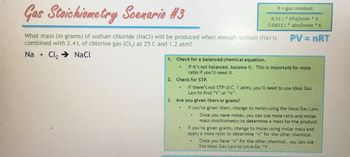
Chemistry
10th Edition
ISBN: 9781305957404
Author: Steven S. Zumdahl, Susan A. Zumdahl, Donald J. DeCoste
Publisher: Cengage Learning
expand_more
expand_more
format_list_bulleted
Concept explainers
Question

Transcribed Image Text:Gas Stoichiometry Soenario #3
What mass (in grams) of sodium chloride (NaCl) will be produced when enough sodium (Na) is
combined with 2.4 L of chlorine gas (Cl₂) at 25 C and 1.2 atm?
Na + Cl₂ ⇒ NaCl
1. Check for a balanced chemical equation.
.
2. Check for STP.
If it's not balanced, balance it. This is important for mole
ratio if you'll need it.
R = gas constant
8.31 L kPa/mole * K
0.0821 L* atm/mole * K
3. Are you given liters or grams?
PV = nRT
If there's not STP (0 C, 1 atm), you'll need to use Ideal Gas
Law to find "V" or "n".
.
If you're given liters, change to moles using the Ideal Gas Law.
Once you have moles, you can use mole ratio and molar
mass stoichiometry to determine a mass for the product.
If you're given grams, change to moles using molar mass and
apply a mole ratio to determine "n" for the other chemical.
Once you have "n" for the other chemical, you can use
the Ideal Gas Law to solve for "V"."
Expert Solution
This question has been solved!
Explore an expertly crafted, step-by-step solution for a thorough understanding of key concepts.
This is a popular solution
Trending nowThis is a popular solution!
Step by stepSolved in 3 steps

Knowledge Booster
Learn more about
Need a deep-dive on the concept behind this application? Look no further. Learn more about this topic, chemistry and related others by exploring similar questions and additional content below.Similar questions
- Examine the following balanced equations and identify the mole-to-mole ratiosarrow_forward44) What is the coefficient of phosphorus after balancing the following equation?__ P(s) + __ O2 (g) º __ P2O5 (s)(a) 1 (b) 2(c) 4 (d) 5(e) none of the above45) What is the coefficient of chlorine gas after balancing the following equation?__ Fe(s) + __ Cl2 (g) º __ FeCl3 (s)(a) 1 (b) 2(c) 3 (d) 4(e) none of the above46) What is the coefficient of oxygen gas after balancing the following equation?__ HgO(s) º __ Hg(s) + __ O2 (g)(a) 1 (b) 2(c) 3 (d) 4(e) none of the above47) Which of the following types of chemical reactions is illustrated below?2 Sr(s) + 2 H2O(l) º 2 Sr(OH)2 (aq) + H2 (g)(a) combination (b) decomposition(c) single replacement (d) double replacement(e) neutralization48) What is the predicted product from the following reaction? Al(s) + O2 (g) º(a) AlO (b) Al2O(c) AlO2(d) Al2O3(e) Al3O249) Which of the following solid compounds is soluble in water?(a) NiCO3(b) PbCrO4(c) Ag3PO4(d) CuS(e) Ba(OH)250) What are the products from the following double replacement reaction?BaCl2…arrow_forwardReview sheet: percent yeild of fermentation reaction (chemistry)arrow_forward
- calculate number of 2 liter bottles would be needed to contain all the CO2 your dream car produces. car is tesla model 3 balanced equation 2 C8H18 + 25 O2 = 16 CO2 + 18 H2O the car gets 132 miles per gallon calculate for one year, assuming 1 year is 15,000 milesarrow_forwardI don’t completely understand how to do this, detailed help please? Thank you!arrow_forwardApply the significant figure rules to the final answer. The rules are attached. The final answer will not be 5.73.arrow_forward
- can someone help me out with question c ?arrow_forwardv Al(s) + Cl2(g)→ AICI3(s) v Na(s) + v N2(g) → v NazN(s) v C2H4(g) + v 02(g) - CO2(g) + v H20(g) QUESTION 7 What is the molar mass of C12H1802 in g/mole? QUESTION 8 v Law states that for a fixed amount of gas at a Click Save and Submit to save and submit. Click Save All Answers to saVE searcharrow_forwardQuestion 13arrow_forward
- Question 19 of 30 Submit Iron reacts with oxygen gas to form a mixture of FeO and Fe,O3 when the supply of oxygen is regulated. A sample of 20.00 g iron metal reacts with oxygen gas to form 28.20 g iron oxide mixture, and all of the iron metal was consumed. What is the mass in g of FeO that were produced in the mixture? 1 4 6. C 7 +/- х 10 0 Tap here or pull up for additional resources LO 00arrow_forwardBalanced Equation: Mg + O2 → Mgo 4. How many grams of magnesium are required to form 500. grams of magnesium oxide? A: В: Solve:arrow_forward1. Given the balanced equation: Fe203(s) + 3CO(g)→ 2Fe(s) + 3CO2(lg) What is the total number of moles of Fe produced when 95 g of Fe203 reacts completely with CO? 0.54 mol 0.81 mol 1.2 mol 1.8 mol Save for later Save and continue Next questionarrow_forward
arrow_back_ios
SEE MORE QUESTIONS
arrow_forward_ios
Recommended textbooks for you
 ChemistryChemistryISBN:9781305957404Author:Steven S. Zumdahl, Susan A. Zumdahl, Donald J. DeCostePublisher:Cengage Learning
ChemistryChemistryISBN:9781305957404Author:Steven S. Zumdahl, Susan A. Zumdahl, Donald J. DeCostePublisher:Cengage Learning ChemistryChemistryISBN:9781259911156Author:Raymond Chang Dr., Jason Overby ProfessorPublisher:McGraw-Hill Education
ChemistryChemistryISBN:9781259911156Author:Raymond Chang Dr., Jason Overby ProfessorPublisher:McGraw-Hill Education Principles of Instrumental AnalysisChemistryISBN:9781305577213Author:Douglas A. Skoog, F. James Holler, Stanley R. CrouchPublisher:Cengage Learning
Principles of Instrumental AnalysisChemistryISBN:9781305577213Author:Douglas A. Skoog, F. James Holler, Stanley R. CrouchPublisher:Cengage Learning Organic ChemistryChemistryISBN:9780078021558Author:Janice Gorzynski Smith Dr.Publisher:McGraw-Hill Education
Organic ChemistryChemistryISBN:9780078021558Author:Janice Gorzynski Smith Dr.Publisher:McGraw-Hill Education Chemistry: Principles and ReactionsChemistryISBN:9781305079373Author:William L. Masterton, Cecile N. HurleyPublisher:Cengage Learning
Chemistry: Principles and ReactionsChemistryISBN:9781305079373Author:William L. Masterton, Cecile N. HurleyPublisher:Cengage Learning Elementary Principles of Chemical Processes, Bind...ChemistryISBN:9781118431221Author:Richard M. Felder, Ronald W. Rousseau, Lisa G. BullardPublisher:WILEY
Elementary Principles of Chemical Processes, Bind...ChemistryISBN:9781118431221Author:Richard M. Felder, Ronald W. Rousseau, Lisa G. BullardPublisher:WILEY

Chemistry
Chemistry
ISBN:9781305957404
Author:Steven S. Zumdahl, Susan A. Zumdahl, Donald J. DeCoste
Publisher:Cengage Learning

Chemistry
Chemistry
ISBN:9781259911156
Author:Raymond Chang Dr., Jason Overby Professor
Publisher:McGraw-Hill Education

Principles of Instrumental Analysis
Chemistry
ISBN:9781305577213
Author:Douglas A. Skoog, F. James Holler, Stanley R. Crouch
Publisher:Cengage Learning

Organic Chemistry
Chemistry
ISBN:9780078021558
Author:Janice Gorzynski Smith Dr.
Publisher:McGraw-Hill Education

Chemistry: Principles and Reactions
Chemistry
ISBN:9781305079373
Author:William L. Masterton, Cecile N. Hurley
Publisher:Cengage Learning

Elementary Principles of Chemical Processes, Bind...
Chemistry
ISBN:9781118431221
Author:Richard M. Felder, Ronald W. Rousseau, Lisa G. Bullard
Publisher:WILEY